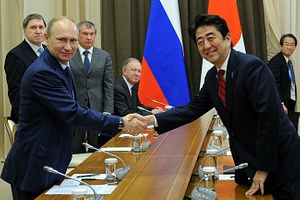This article is along the lines of what the intelligence community calls a “red team” or alternative analysis, something that seeks to explore alternative or low-probability scenarios against what are generally accepted geopolitical narratives. While it is hardly certain at this point that Russia will make a dramatic and strategic shift toward the East, considering how such a shift might impact its relationship with a country such as Japan is worthwhile, especially given that the two have attempted to maintain working relations despite the ongoing crisis in Ukraine and Japan’s attachment to U.S. foreign policy.
As my colleague Ankit noted yesterday, on Monday Japan imposed sanctions on Russia over its support of anti-Kiev rebels accused of shooting down Malaysian Airlines Flight MH17, in line with measures taken by the EU and G7. These new sanctions, while tougher and obviously detrimental to ties between Tokyo and Moscow, did not appear to quite measure up to the measures that have been imposed by the U.S. Nevertheless, Japan’s sanctions showed that it had sided with its security guarantors in Washington D.C. over advancing negotiations concerning the disputed Kuril Islands/Northern Territories or possible future energy deals with Russia.
On Tuesday however, two more events showed that Russia and Japan’s relationship may be souring even further, or that perhaps the status quo in Northeast Asia could shift in the near future if events in Europe continue to go against Russian interests. Without a pro-Moscow government in Kiev, or at least one not hostile to its interests, Russian energy export options in Europe dwindle as a large part of its exports go through Ukraine. As Russia’s recent sweetheart natural gas deal with China shows, Moscow is seriously considering a strategic shift in its energy market away from Europe and toward the large population centers of East Asia.
Russia’s Foreign Ministry on Tuesday chastised Japan for its latest sanctions, saying they would have an adverse effect on bilateral relations, and that Japan’s assurances of its openness to continued relations with Moscow were“simply a smokescreen covering the inability of Japan’s politicians to break out of Washington’s wake and carry out their own individual line of policy.”
Also on Tuesday, Japan’s Defense Minister Itsunori Onodera met with his French counterpart Jean-Yves Le Drian in Tokyo and “expressed strong concern” about France’s continued plan to sell helicopter carriers to Russia, given the potential impact it could have on East Asian security. Onodera used almost uncharacteristically strong language, saying “‘Strong concern’, in a sense, means we want them to stop the deal,” and that “the world is highly concerned about Ukraine and we are worried about the recent military buildup in Russia’s Far East. If the ship is deployed to its namesake, that would be something that makes the whole world concerned.”
Onodera is concerned about the helicopter carrier being “deployed to its namesake” in Vladivostok. Japan is also possibly worried about a strategic shift on the part of Russia to East Asia. This type of hardware in the eastern theater would at least indicate a shift in Russian tactical capability, as well as signal its intent to focus on East Asia, where it finds itself less encumbered by hostile neighbors and more readily able to do business with countries like North Korea, which is looking to balance against its over dependence on China, or China, which has no strategic interest in seeing the U.S. emboldened in East Asia by an isolated Russia. While both Japan and the U.S. have substantial military assets, a strategic shift east by Russia could potentially change the regional power balance, especially if ties with China continue to warm.
There is the counter-argument that Japan makes an excellent customer for potential Russian energy exports. Yes, Japan is a large and developed market with a huge appetite for energy imports, but it is also firmly placed in Washington’s orbit of influence, something Japan again affirmed on Monday. And Japan will not be a growth market for Russian energy for long: Tokyo is seeking multiple energy deals in Southeast Asia and Latin America to meet its new energy demands after shutting down its nuclear reactors. Additionally, Japan’s demographic problems mean that even if Russia were able to secure a substantial portion of Japanese energy demand, it could not depend on growth in Japan without significantly undercutting new (and cheaper) natural gas imports from places like the U.S. and Australia.
While the resolution of their shared islands dispute and potential deals for natural gas are enticing for both countries, their larger strategic interests are still quite divergent. A normalizing Japanese military staunchly allied with the U.S. is not a partner Russia can trust over the long-term, if it seeks to shift its focus toward Eastern markets. Russia may also feel that it has already made its strategic decision in the region by signing its natural gas deal with China, which has a larger market and is also integrated with other Russian client states in Central Asia.
Even with the low probability of this scenario unfolding following current events in Ukraine, the fact that Russia and Japan have reacted so quickly and negatively to each other is indicative of the underlying realities in East Asia. Given Japan’s current alliances, its own increased military posture, and its stance against China, it will be difficult to avoid tensions with Russia should it choose to even minimally increase its security profile in the region.
































